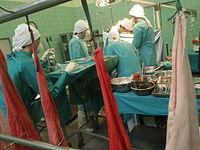
Photo from wikipedia
In patients with severe cardiogenic shock, temporary mechanical circulatory support has become a viable strategy to bridge patients to heart transplantation. However, end-stage heart failure is often associated with progressive… Click to show full abstract
In patients with severe cardiogenic shock, temporary mechanical circulatory support has become a viable strategy to bridge patients to heart transplantation. However, end-stage heart failure is often associated with progressive organ dysfunction of the liver or kidney. This can require a dual organ transplant for definitive management (combined heart-liver [HL] or heart-kidney [HK] transplantation). We evaluated temporary mechanical support to bridge patients to HL or HK transplant at a single, high-volume center. All patients who underwent Impella 5.0 placement from January 2014 to October 2018 were identified. From this dataset, patients who underwent placement as a bridge to dual organ transplant were selected, as were those who underwent Impella as a bridge to isolated heart transplant. Over the 5 years of evaluation, 104 patients underwent Impella 5.0 placement. Of these, 14.3% (n = 15) were identified as potential dual organ recipients (11 HK, 4 HL). In total, 80% (12/15) successfully underwent dual organ transplant (8 HK, 4 HL), with a 1-year survival of 100% in both transplanted groups. Among patients undergoing Impella 5.0 placement as a bridge to isolated heart transplant (n = 33), 78.8% (26) were successfully bridged, and 1-year survival was 92% after transplantation. Impella 5.0 is a viable bridge to dual organ transplantation and should be considered as a management strategy in these complex patients at experienced institutions.
Journal Title: ASAIO Journal
Year Published: 2022
Link to full text (if available)
Share on Social Media: Sign Up to like & get
recommendations!